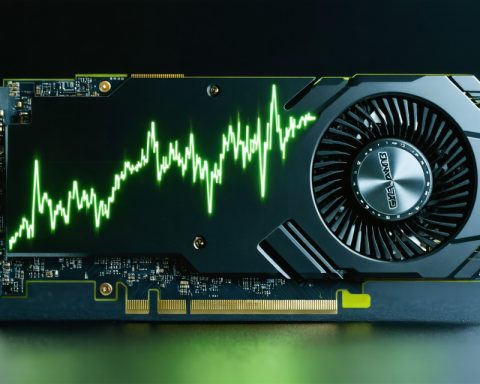- Rocket Lab USA is a major player in small satellite launches, ranked second in the U.S. behind SpaceX with its Electron rocket.
- The company completed 16 successful launches in the past year, a 60% increase, indicating strong growth and innovation.
- Ahead lies the introduction of the Neutron rocket in mid-2025, aiming to compete directly with SpaceX’s Falcon 9 by offering comparable payload capacity.
- Rocket Lab’s backlog exceeds $1 billion, with international partnerships fueling demand for their cost-effective launch services.
- Financially, the company reported $304 million in revenue, yet faces challenges with high R&D expenses and operating losses.
- For investors, Rocket Lab’s rising stock symbolizes both opportunity and risk in the expanding space economy.
In the vast theater of space, Rocket Lab USA etches its name among the stars, maneuvering swiftly through the cosmos of small satellite launches. This trailblazer, wielding the agile Electron rocket, has cemented its position as the second-leading launch company in the United States, just behind the juggernaut, SpaceX. With Electron’s frequent, cost-effective voyages, Rocket Lab has become indispensable for companies setting their sights on satellite orbits.
The past year was nothing short of meteoric for Rocket Lab. By completing 16 launches—a staggering 60% increase from 2023—the company not only bolstered its reputation but demonstrated a relentless commitment to pushing technological boundaries. Yet, Rocket Lab doesn’t rest on its laurels. The birth of the Neutron rocket looms on the horizon, a larger vehicle poised to catapult the company into heavyweight competition with SpaceX. Promising a payload capacity nearly matching the formidable Falcon 9, Neutron’s debut is eagerly anticipated come mid-2025.
Rocket Lab’s ambitions are matched only by the galloping demand for its services. Deals inked with international partners and an over $1 billion backlog underscore the allure of its offerings. And while the company’s revenue soared to $304 million last year—with a gross profit doubling over previous periods—the journey ahead is fraught with financial challenges. High R&D expenses and current operating losses paint a picture of risk for cautious investors.
For the daring—those seeking a thrilling plunge into the vibrant tapestry of the space economy—Rocket Lab offers a compelling narrative. Its skyrocketing stock reflects both the allure and peril of investing in a company on the cusp of a new cosmic era. As Rocket Lab prepares for its next chapter, the question remains: will the rewards be as boundless as the space it seeks to explore?
Is Rocket Lab the Next Big Thing in Space: What You Need to Know!
Overview and Features of Rocket Lab
Rocket Lab USA, a pivotal player in the realm of small satellite launches, has rapidly risen to prominence with its Electron rocket, becoming a go-to choice for companies aiming to place satellites into orbit. The company’s remarkable performance over the past year, with a 60% increase in launches, reflects its growing influence and capability.
Real-World Use Cases and Market Demand
Rocket Lab’s services are highly sought after by companies and government entities needing quick, reliable satellite deployments. The Electron rocket’s cost-effectiveness and the company’s ability to frequently deliver payloads on schedule make it ideal for a range of users, from tech startups launching small cube satellites to established firms expanding global communication networks.
Market Forecasts & Industry Trends
The demand for satellite launches is expected to soar as technologies such as 5G, global internet projects, and data analytics via space continue to grow. According to a report by Euroconsult, the small satellite market is projected to launch 7,000 smallsats over the next decade, which bodes well for Rocket Lab’s business as an established leader in small satellite launches.
Neutron Rocket: The Next Big Leap
Rocket Lab’s upcoming Neutron rocket is set to expand the company’s capabilities, enabling it to compete with larger payloads nearly rivaling SpaceX’s Falcon 9. The Neutron rocket is anticipated to debut in mid-2025 and is a significant step for the company as it looks to capture a broader market share.
Features, Specs, and Pricing
– Electron Rocket: Designed for small payloads up to 300 kg, known for rapid, affordable launches.
– Neutron Rocket: In development, will support larger payloads near Falcon 9’s capacity; pricing will be competitive within the medium-lift market segment.
Controversies & Limitations
Rocket Lab faces challenges including high research and development costs and current operational losses. These financial hurdles could pose a risk to investors and impact future technological advancements.
Security & Sustainability
Rocket Lab has committed to sustainable practices, including attempts to recover and reuse Electron’s first stage. However, space industry analysts emphasize the importance of minimizing space debris and ensuring long-term orbital sustainability, areas where Rocket Lab is expected to innovate.
Insights & Predictions
– Expand Offerings: As the space industry evolves, Rocket Lab is likely to extend its services beyond satellite launches, possibly venturing into space station supplies or deep space missions.
– Competitive Edge: By continuously lowering costs and enhancing technology, Rocket Lab can maintain a competitive edge against industry giants.
Tutorials and Compatibility
Potential users and investors can find more comprehensive tutorials on Rocket Lab’s offerings and compatibility with diverse payloads on their official website: Rocket Lab.
Pros & Cons Overview
Pros:
– Cost-effective launch solutions
– High launch frequency
– Agile and responsive to market needs
Cons:
– Financial instability risks
– Strong competitive pressure
– R&D expenses impacting profitability
Actionable Recommendations
– For Investors: Keep an eye on Rocket Lab’s financial performance and developments regarding the Neutron rocket. A balanced approach considering its long-term potential against its current financial metrics is advisable.
– For Companies Seeking Launch Services: Evaluate Rocket Lab’s offerings based on payload requirements and budget. The Electron rocket is ideal for small satellites, while the Neutron rocket will provide additional options upon launch.
By strategically positioning itself in the rapidly expanding space industry, Rocket Lab continues to turn obstacles into opportunities, crafting its path among the stars. To stay updated on their latest innovations, visit the Rocket Lab website.











